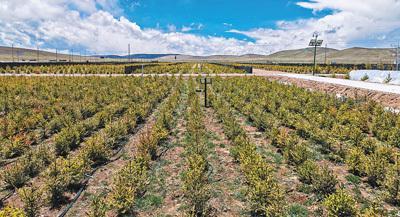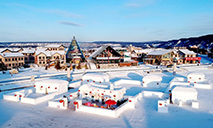Tibet's alpine area turned into oasis: afforestation pays off in Nagqu
"I’ve never seen trees before I came here,” said Sherab, a 52-year-old forest ranger from a village in Nagqu city of southwest China's Tibet Autonomous Region, who was delighted and amazed by the vibrant and lush woods neighboring his village.

Photo shows spruce trees in Nagqu. (Photo/People's Daily)
With an average altitude of 4,500 meters, Nagqu has only about a two-month-long optimal plant growth period annually, making it exceptionally challenging to grow trees here, since seedlings can be easily frozen to death. Therefore, the conventional way for afforestation proved unproductive, and finding a new approach for tree planting there was a thorny problem faced by the technical team.
Efforts on afforestation commenced as early as 1998, when a small tree planting trial base was established by the local technical team, with willows, cypresses and sea-blackthorn being planted tentatively. Not surprisingly, the result was a bit of a hit and a miss.
In 2007, spruce and alpine willow trees were reintroduced for trial planting, but only 14 of them survived. These 14 trees are now the oldest trees in Nagqu city.
In November 2016, a project focusing on the restoration and protection of similar fragile ecological systems was launched by the Ministry of Science and Technology as part of the government development plan.
Great efforts were made from then on in seedling selection and climate monitoring through the use of big data technology, along with the adoption of atomizing spray modes as well as polymer material for wrapping around the tree’s girth, all aimed at raising the temperature of the roots of the trees and improving the survival rate of saplings, explained Hao Wei, general manager of an eco-company, Elion Group, in Nagqu.
After more than five years of hard work, the research team finally succeeded, developing a feasible tree-planting model in cold and high-altitude areas and planting 400,000 trees, with a survival rate of 75 percent.
According to Wang Wenbiao, chairman of Elion Group, the company has kept in mind and carried out the concept that clear waters and green mountains are mountains of gold and silver, and adopted various scientific and technological means to speed up the promotion of the afforestation achievements in Nagqu, so as to make greater contributions to the protection of Tibet's ecological environment and enable people in the alpine and high-altitude areas to live a happy life.
"Our children are so happy because they can see trees from an early age," said Sherab with a smile, adding that "I'll take good care of the trees."
Photos
Related Stories
- Nagqu in Tibet tackles difficulties in high-altitude afforestation
- Scenery of Sapukonglagabo Mountain in Nagqu, China's Tibet
- Nagqu: a Tibetan county's continuous development
- Beautiful scenery of Namtso
- Nagqu solve drinking water problem of 0.2306 mln people
- World's highest five-star hotel opened in Nagqu
Copyright © 2021 People's Daily Online. All Rights Reserved.










